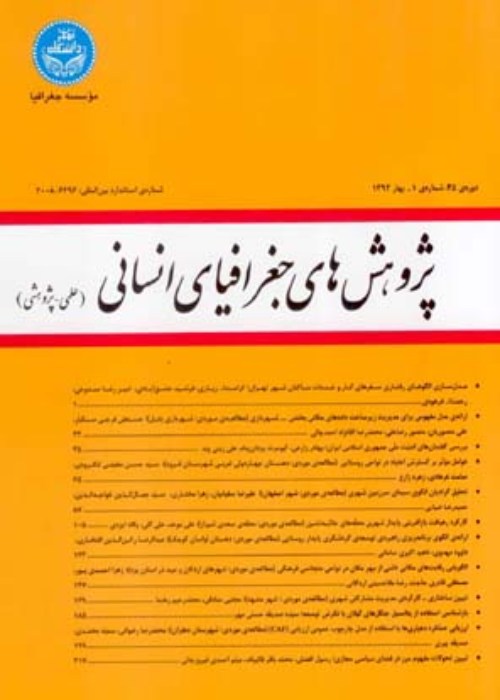The geopolitical role of Middle Eastern and North African countries in regional securityCase study: Iran and the Arabs
Throughout history, the often presence of "power" and "wealth" alongside "ideology" and "competition" has led to the formation of hostile relations between countries. Among the regions of the world, the Middle East and North Africa have more complex relationships to achieve security due to the presence of countries with special characteristics and if the wrong strategies are adopted by the powers that be in this region, the result will be unsolvable. As we approach the third decade of the twenty-first century, headlines from the Middle East are dramatic and worrisome, and often characterized by upheaval and change. The MENA are the sensitive areas of security and energy in the world and have witnessed many tensions and conflicts. The contemporary conflicts including Palestinian occupation, Iran–Iraq War, Invasion of Kuwait, United States invasion of Afghanistan, 2003 invasion of Iraq, the Arab Spring and the emergence of Islamist groups like Taliban and ISIL. One of the influential poles in this region is Iran, which is one of the most influential countries in the region. Middle Eastern and North Africa countries have very complex relations with each other. In order to secure their interests and security, each of the countries in the region seeks political and security cooperation with other countries. On the other hand, countries with higher geopolitical weights will be more influential. Therefore, in order to reveal the reciprocal and constructive relationship between the countries of the region and security, the concepts of "region" and "security" must be opened. Finally, we evaluate the interaction between the security of the Arab countries and Iran, which has led to major changes in the geopolitical relations of the region and we look at the security situation in the region in light of these developments. What historical, social, and economic factors explain the similarities and the differences that we observe?
The descriptive-analytical research method and the reliability of the research have been evaluated through the quasi-Delphi's questionnaire and the reliability of the assessment tool with Cronbach's alpha test. The situation of security discourses in Iran and the Arab countries in the region has been assessed with three values: solidarity (1), negative solidarity (1) and non-solidarity (0); And through the questionnaire, 10 countries were selected and the numerical weighting of the Likert scale (between 0 and 5) was performed, and we obtained the coefficients of "geopolitical weight in the region" and "communication with Iran". To measure the reliability of the statistical test questionnaire with Spearman-Brown's prediction of 0.75, Cronbach's alpha coefficient of 0.72 (acceptable) was obtained. All findings have been analyzed with the Excel software model and converted to a concept model in the form of a diagram by iThoughtsX and Ps 2018 software. Statistical population: Experts and students, sample community: 10 professors and 20 students as "Convenience Sampling" method through a questionnaire (5 professors and 10 students) and "non-structured interview" (5 professors and 10 Students).
since 1979 has reduced poverty and expanded its middle class and literacy rates, which has boosted Iran's power. Iran’s growing power and Saudi Arabia may remain powerful and influential relative to states in the region that are grappling with instability but they will be at odds with each other on a variety of issues. Recent developments in the Middle East are a manifestation of the "conflict" pattern. As another pole, Saudi Arabia alone cannot play a geopolitical role due to its low geopolitical weight compared to Iran in the region. Given the combination of communication and geopolitical weight, this description correctly shows that there is a weak connection between the two influential poles of the region, namely Iran and Saudi Arabia. On the other hand, it should be noted that according to Buzan's theory, poles in the Middle East and North Africa determine the direction of the region and that means defining the region's line and mesh by two conflicting powers. In this regard, Iran can take into account its geopolitical weight and national strength and recognize its true position in order to have a realistic assessment of the existing threats and opportunities.
Unfortunately, the evidence shows that the region's political systems do not work for collective security. The geopolitical limitation of the region can be considered as a lack of sufficient attention to the "position" and "role" of Iran by the Arab countries of the region. In other words, the countries of the region are aware of the influential geopolitical role of Iran, but they are weak in terms of their relationship with this role. The key to achieving this security in the region is the realization of convergence and the growth of the positive correlation coefficient with Iran in both groups of countries with "negative" and "cross-sectional" interactions which paves the way for convergence and access to regional security in the Middle East and North Africa security complexes and if that happens, it will lead to convergence with Europe and the international community. The results show that Saudi Arabia, the United Arab Emirates, Bahrain, Jordan, Egypt and Morocco are in the same group. Also, the countries of Kuwait, Qatar, Oman, Libya, Tunisia and Algeria are present in a cross-sectional communication group. At one time, these countries were pro-Iranian and at other times pro-Saudi; and they generally follow the "principle of national interests" and the "principle of ideology". And finally, Iraq, Palestine, Syria, Lebanon and Yemen, which in most cases have aligned themselves with Iran's goals.Because the two countries, along with their allies, have created almost the same geopolitical weight, they are unable to eliminate each other. The conflict between them will only make the situation more critical and complicate the balance of power, so the convergence of these forces must be at the forefront of the goals of Iran and Saudi Arabia, otherwise we will never achieve regional security.
Regional security , MENA , Iran , Arabs , Geopolitics
- حق عضویت دریافتی صرف حمایت از نشریات عضو و نگهداری، تکمیل و توسعه مگیران میشود.
- پرداخت حق اشتراک و دانلود مقالات اجازه بازنشر آن در سایر رسانههای چاپی و دیجیتال را به کاربر نمیدهد.



